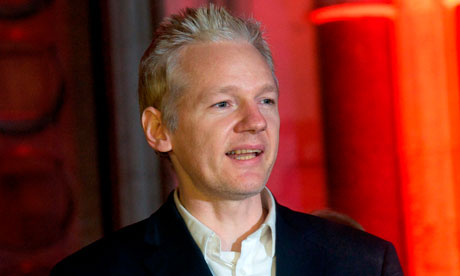US lawyers explore extradition routes for Julian Assange
US justice department has still not approached British government as lawyers struggle to mount prosecution

A US congressional committee took evidence from a variety of lawyers about the possibility of bringing a prosecution against Julian Assange under the Espionage Act, as well as the legal and constitutional issues raised by the Wiki-Leaks revelations. The hearing was in front of the house judiciary committee.
There is a consensus growing among US constitutional lawyers and others, while rehearsing all the problems attached to bringing a prosecution, that Assange will be indicted. But they doubt the chances of obtaining his extradition from Britain, and they think it will be harder still should he be sent to Sweden.
One of Assange's lawyers, Jennifer Robinson, told ABC News last week that an indictment could be imminent.
But when asked if the US had approached the British government about extradition, a British embassy spokesman in Washington said today: "We do not comment on extradition." Privately, British diplomats indicated that there had been no substantive discussions with the Americans on any impending extradition request.
US lawyers are sceptical as to whether Assange could be prosecuted under the Espionage Act, and suggested the justice department must look at alternatives.
Another of Assange's lawyers, Mark Stephens, told al-Jazeera television that a secretly-empanelled grand jury was already meeting in Alexandria, Virginia, with a view to his prosecution. A spokeswoman for the justice department refused to comment.
Abrams said that the Bush administration brought hard cases to Alexandria rather than DC, and it would be interesting if the Obama administration were to do the same. "DC is the most natural place, but is likely to be more pro-defendant; Virginia courts are more amenable to the prosecution," Abrams said.
He added: "There would certainly be an indictment if Assange had encouraged [Bradley Manning, the US army private suspected of being behind the leak] to provide the information and a mechanism to do so. That would make it easier for the justice department to bring a conspiracy charge. I would not have given the chances as 80%. I do think it is better than even they will proceed."
One argument that Assange and WikiLeaks could make is that it is a news organisation, as it describes itself on its website, and therefore should be protected from prosecution under the freedom of the press. It could be argued that if Assange were to be prosecuted, why not the New York Times or the Guardian?
"Newspapers like the Guardian add analysis and value to the enterprise. WikiLeaks is just a compiler or a means of distribution. As for Assange's character, he seems likely not to be well received by an American jury if he ever goes in front of one."
Scott Silliman, a professor at the Duke University, also thought the justice department might be considering charging Assange with conspiracy in his dealings with Manning. "That would be a very 'fact dependent' case, however, because it would require the government to prove beyond a reasonable doubt Assange solicited the files from Manning."
"Interestingly, though, if those facts are proven, that would be no different than what many US newspaper reporters do in dealing with their sources.
All this is to say that whether the government charges a violation of the Espionage Act or solicitation, the case would still be highly problematic and would be a very controversial precedent with relation to the media in this country."
The TV channel MSNBC this week interviewed a panel of lawyers, including Rosenzweig. The consensus was that a legal challenge was likely. One of the panel, Abbe Lowell, said: "The WikiLeaks disclosures are getting bolder and causing more controversy. The US will find some way to bring charges, because not doing so will be deemed bad legal precedent, bad foreign relations, and bad national politics."
